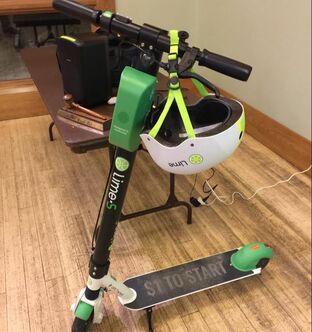 We learned some new jargon while we were learning about electric scooters at the Feb. 19 Evanston Bicycle Club (EBC) meeting. For example: “Electric Scooter” (also known as e-scooter), a shared, dockless, application based, micro-mobility device that requires charging “Scooting”, the act of using an e-scooter. “Juicing’, the practice of charging Lime brand scooters; people who are authorized to pick up and charge e-scooters at their homes at night for a fee are called Lime juicers “Geofencing”, the use of GPS or RFID technology to create a virtual geographic boundary Maggie Melin, Advocacy Manager at Active Transportation Alliance, started our education by citing the beginning of the scooter craze in Santa Monica CA in September, 2017 with the operator of the Bird brand scooters dropping scooters in the community without permission. In less than 2 years there are 18 state with e-scooter sharing programs. Advantages of e-scooters are:
E-scooters are current not allowed in Chicago. To help recommend what the policy for e-scooters in Chicago should be, Active Trans conducted an e-scooter survey, analyzed the results of a 120 day pilot in 2018 in Portland, OR and reviewed a study by DePaul University. Among their recommendations are:
Operators of e-scooter programs include Bird, Bolt, Jump (Uber), Lyft, RazorUSA, Scoot Networks, Skip, Spin (Ford), and Lime. Matt Donelan, Operations Manager of Lime in Chicago was in attendance with an actual Lime e-scooter. Lime is an American company that operates mostly on the west coast. One of the advantages of e-scooters as a micro-mobility option is that there is no need for docking stations. The result is:
Comments are closed.
|
Earth Rider Blog about CycingAuthorSharon Kaminecki and others comment on adventures in bicycling and other stories Categories
All
Archives
August 2023
|


